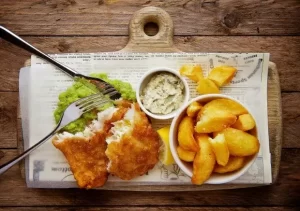
Welcome to the exciting world of food franchising! If you’ve ever dreamed of being a part of the thriving food industry and owning your own business, a food franchise can be a fantastic opportunity. However, before you dive into this endeavor, it’s crucial to be well-informed and prepared. In this article, we will explore five essential tips to consider before owning a food franchise. These tips will provide you with valuable insights and expert advice to help you make the right decisions and set your franchise up for success.
1. Conduct Thorough Market Research
One of the most critical steps before owning a food franchise is conducting thorough market research. Understanding the current market trends, consumer preferences, and potential competition will be the foundation of your business strategy. LSI Keyword: food franchise market analysis
Begin by identifying the target demographic for your food franchise. Determine the demand for your type of cuisine in the chosen location. Analyze the purchasing power of potential customers and their dining habits. Additionally, research your competitors to identify gaps in the market that your franchise can fill. Armed with this knowledge, you can tailor your menu and marketing efforts to meet the specific needs of your target audience.
2. Choose the Right Franchise
Choosing the right franchise is a crucial decision that can significantly impact your success as a food franchise owner. Not all franchises are created equal, so take the time to carefully evaluate your options. LSI Keyword: food franchise selection
Look for well-established franchises with a proven track record of success. Consider the brand’s reputation, financial stability, and overall growth potential. Review the franchise agreement thoroughly, and if possible, consult with existing franchisees to gain insights into their experiences. Selecting a reputable and compatible franchise will provide you with the necessary support and resources to thrive in the competitive food industry.
3. Assess Your Financial Capacity
Owning a food franchise requires a significant financial investment. Before you take the plunge, assess your financial capacity realistically. LSI Keyword: food franchise financing
Create a detailed business plan that outlines all the costs involved, including the initial franchise fee, equipment, inventory, marketing, and operational expenses. Determine your funding sources, which may include personal savings, bank loans, or investors. It’s crucial to have a solid financial plan in place to ensure that you can sustain and grow your franchise until it becomes profitable.
4. Location is Key
In the food industry, location plays a pivotal role in the success of your franchise. LSI Keyword: food franchise location strategy
Identify high-traffic areas with a considerable number of potential customers. Consider factors such as visibility, accessibility, and proximity to complementary businesses. A prime location can attract a steady flow of customers and contribute significantly to your franchise’s profitability.
5. Training and Support
Even if you have prior experience in the food industry, investing in a franchise will come with its unique set of challenges. LSI Keyword: food franchise training and support
Ensure that the franchise you choose offers comprehensive training programs for you and your staff. This training should cover various aspects of the business, including operations, customer service, and quality control. Ongoing support from the franchisor will also be vital in helping you navigate any hurdles that may arise as you establish and grow your food franchise.
FAQs About Owning a Food Franchise
Q: How much does it cost to own a food franchise?
A: The cost of owning a food franchise can vary widely depending on the brand, location, and size of the franchise. Initial investments can range from several thousand to millions of dollars. It’s essential to conduct thorough research and carefully review the franchise agreement to understand all the costs involved.
Q: Is owning a food franchise a guaranteed success?
A: While owning a food franchise can be a rewarding venture, success is not guaranteed. It requires hard work, dedication, and adherence to the franchisor’s guidelines. Conducting market research, choosing the right franchise, and ensuring proper location and financial planning will increase your chances of success.
Q: Can I run a food franchise as a passive investor?
A: In most cases, food franchises require active involvement from the franchise owner, especially in the initial stages. While you can hire managers to oversee day-to-day operations, active engagement and oversight are essential to maintain the brand’s standards and ensure success.
Q: Are there ongoing fees in addition to the initial franchise fee?
A: Yes, most food franchises charge ongoing fees, including royalties and marketing contributions. These fees are typically a percentage of your gross sales and contribute to the continuous support and development of the franchise.
Q: Can I negotiate the terms of the franchise agreement?
A: Franchise agreements are typically standardized, and the terms are not negotiable. However, you can seek legal advice to ensure you fully understand the agreement and its implications before signing.
Conclusion
Owning a food franchise can be a fulfilling and profitable venture with the right approach. By conducting thorough market research, choosing the right franchise, assessing your financial capacity, selecting a prime location, and prioritizing training and support, you set the stage for a successful food franchise business. Remember that success in the food industry requires dedication, hard work, and a passion for providing excellent food and service to your customers.
So, are you ready to embark on this exciting journey of food franchising? Follow these five tips, put your heart into it, and watch your food franchise flourish!
Everyone loves food, right? That’s why it’s not surprising that the food franchise industry is one of the most booming businesses in the world. As more and more people are finding out about the perks of owning a food franchise, entrepreneurs and aspiring businessmen alike are looking at the prospect of starting up their own food franchises. And why not? The perks are plentiful.
However, before jumping headfirst into this type of business, it is important to be aware of all the things that go along with owning one. There are now a plethora of food franchises available to own, including restaurants, ice cream stores, coffee shops, bakeries, and many other types. Before you decide to become a franchisee, take some time to consider the five tips provided below.
1. Do Your Homework
Franchising a food business is not a decision you should make lightly. There are many factors that need to be considered before signing on the dotted line, and it’s important to do your research before making a final decision.
The first thing you should do is understand what kind of business you want to own. Is it a traditional restaurant, or are there other options? Do you want to sell directly from your home or through an established store? Are there any health regulations that may apply?
Once you’ve decided what type of food franchise will suit what you envision, it’s time to look at how much money and time it will take to get started. Start-up costs vary widely depending on the type of food franchise you choose, but they can range anywhere from $200,000 to well into the millions—and if you don’t have those funds available right away, don’t worry! There are plenty of loans available that can help cover those costs while also allowing you time to save up money for them later on down the road when things get more stable in your business plan.
2. Think About Your Niche
Food franchises are a great way to start a business, but it’s important to consider your niche before you buy. The reason for this is that there are many different types of food franchises available, and not all of them are right for everyone. The most important thing you can do when deciding whether or not to buy a food franchise is to think about what kind of food you want to sell.
Do you want something that’s trendy or something that people will always want? Do you want a restaurant where customers can eat in and enjoy the atmosphere? Or do you want something that people can pick up on their way home from work? Do you want something healthy or unhealthy? These are all important questions to ask yourself before looking at franchises so that you can find one that fits both your needs and those of your potential customers.
3. Is the Competition Too Tight?
Let’s say you are planning to get a Shipley Do-nuts franchise, but are not sure if it’s something that will click in your area. Another thing to consider is whether or not there’s competition in your market—if there are other donut stores that sell similar items nearby or even in the same location as yours.
This could mean that demand is low enough that it would take longer than expected before profits started coming in. However, if there are plenty of other places nearby selling similar products but without the same number of locations available, then demand will likely be high enough for profitability within a projected period of time.
By taking these factors into account before opening your own food franchise, you’ll be able to tailor your business’s image and product offerings accordingly so that people will associate them with exactly what they’re looking for when they think about eating at an establishment like yours.
4. Have a Business Plan
You’re ready to take the plunge and open a food franchise. Before you leap, you need to consider whether or not you have what it takes to be successful, and you can do this by having a business plan.
Having a business plan helps you see the problems that will come up and how to solve them. Part of this plan is to make sure that you have all of the necessary information about the company or product that you want to sell. This includes researching competitors, market trends, and what customers are looking for in their purchase choices. More importantly, having one will help you figure out where your strengths lie and how they can help support your business plan.
5. Talk With Other Franchise Owners
One of the best things you can do when you’re thinking about buying a food franchise is to talk to other franchise owners. If, for example, you want to apply for a coffee franchise, it’s a good idea to get as many perspectives as possible, so that you can really understand what it means to own that kind of franchise business and whether or not it’s really right for you.
Franchise owners will be able to tell you everything from how they got started with the company they are working with, to how they were able to grow their business and what kind of challenges they faced along the way.
Talking with other franchise owners can help you make an informed decision about whether or not this is something that would work for your situation. You’ll be able to see if there are any inherent risks involved with owning a food franchise and if there are ways around those risks that might make more sense for your needs.













